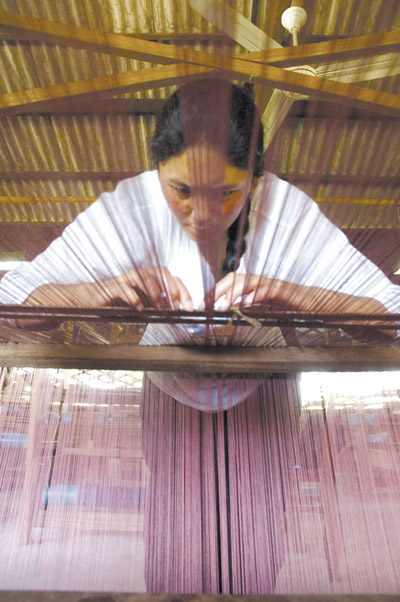 |
| A woman works on a loom at the Norlha workshop.Photo provided to China Daily |
Kim Yeshi had studied anthropology and Buddhism at university and spent 30 years in Asia researching local culture, with particular interests in textiles and handicrafts.
"People always talk about the cashmere as the precious wool, and camel wool. Although the yak also has wool, it had never been tested," the mother says.
"I thought it would be compelling to turn the yak wool into a new vision of life for the nomads."
When Dechen first arrived in Zorge Ritoma in 2004. She spoke to many young nomads, and they all wanted to be a part of the world outside, and "that fitted in with my mother's idea".
She decided that it made more sense to help that way.
"Making documentaries meant a lot to me but not as much to them."
She returned the next year with her brother Genam and they collected and shipped two tons of khullu to a textile factory in Kathmandu owned by her mother's friend. The end product was soft and warm and had a very good feel.
Inspired, the Yeshis founded Norlha, a social enterprise for yak wool production, and they started to look for villagers willing to participate in the project. "Norlha" means "wealth of the God" and is also what Tibetan nomads call the yak.


 Luxury-cars parade held in Dubai
Luxury-cars parade held in Dubai Special forces take tough training sessions
Special forces take tough training sessions Fire guts 22-storey Nigeria commercial building in Lagos
Fire guts 22-storey Nigeria commercial building in Lagos Singles Day:
Singles Day:  Temperature drops dramatically in Beijing
Temperature drops dramatically in Beijing Typhoon Haiyan hits south China's Hainan
Typhoon Haiyan hits south China's Hainan Top 10 celebrity moms in China
Top 10 celebrity moms in China Weekly Sports Photos:
Weekly Sports Photos: Gingko leaves turn brilliant golden yellow in Beijing
Gingko leaves turn brilliant golden yellow in Beijing Maritime counter-terrorism drill
Maritime counter-terrorism drill Love searching stories in cities
Love searching stories in cities Living in an urban village: 'Iron-digger' Xiong Sansan
Living in an urban village: 'Iron-digger' Xiong Sansan China in autumn: Kingdom of red and golden
China in autumn: Kingdom of red and golden National Geographic Traveler Photo Contest
National Geographic Traveler Photo Contest Weekly Sports Photos
Weekly Sports PhotosDay|Week|Month